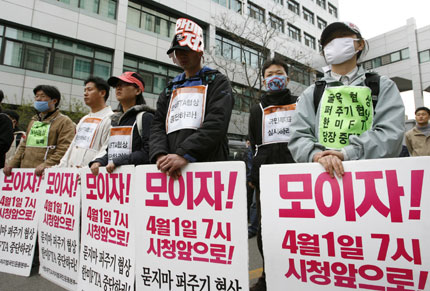S.Korea, US reach last-minute free trade deal
(Reuters)Updated: 2007-04-02 13:44
The deal came after nine months of negotiations and sometimes violent protests in South Korea, mostly over fears that the country's heavily subsidised farmers could not survive a flood of cheaper U.S. farm products.
Seoul agreed in the end to phase out its 40 percent tariff on U.S. beef over 15 years, but it was not immediately clear how much the two sides had conceded on other issues and whether South Korea's long-protected rice market would be opened up.
"We expect the FTA (free trade agreement) to provide a springboard for our economy to leap to an advanced economy," a press official quoted President Roh Moo-Hyun as saying.
The deal between the United States and Asia's third-largest economy was struck just minutes before time ran out for the White House to use legislation allowing it to present a deal to Congress that can be rejected or accepted, but not changed.
Some estimates say an agreement could add $20 billion to the already more than $70 billion of two-way trade each year.
U.S. President George W. Bush, in a letter to Congress released by the White House, said agreement would bring export opportunities for a range of U.S. businesses, promote economic growth and provide jobs.
"(It) will also further enhance the strong United States-Korea partnership, which has served as a force for stability and prosperity in Asia," he said.
LAST-MINUTE HAGGLING
Much of the final bargaining focused on whether the parties could concede enough to each other on farm goods and cars, with both sides seeking lower tariff and other barriers to auto imports.
The United States also wanted greater access to South Korea's lucrative financial services, including insurance, while Seoul pressed Washington to change anti-dumping laws it says are unfairly applied to its products.
Expectations that the two sides would strike a deal helped boost South Korea's stock market to a five-week high, especially auto stocks, which are seen as benefitting from greater access to the U.S. market.
"If industries wake up and restructure and are reborn to compete more globally, that's good for the companies that survive and to their shareholders," said Thomas Choi, head of research at PCA Asset Management.
Negotiators had seemed on the verge of a deal after Bush and Roh agreed last week to instruct negotiators to be flexible.
But last-minute haggling meant missing two self-imposed deadlines over the weekend.
The trade agreement had to be with Congress by the end of Sunday Washington time (0400 GMT) if it was to meet the 90-day required notice period. If they had missed that, talks would likely have dragged on for years.
|
||
|
||
|
|

